The ‘B’ Word: Republicans Fan the Flames of Ageism
With millennials up for grabs and Democratic front-runners getting older, boomer bashing is all the rage in politics.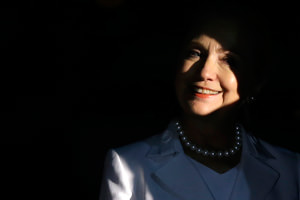
“The average Republican primary voter is deceased,” Frank Luntz, Fox News commentator and GOP uber-pollster, said in February.
His advice for wooing younger voters? “Don’t give them terminology they don’t understand.” It’s about “communicating a simple phrase, three words: ‘I get it.’ ”
Luntz was sharing his prescription for dumbing down political rhetoric with outlier tea party candidate Allen West on a new website called Next Generation TV, but as The New York Times reported June 29, GOP stalwarts are taking his advice, courting millennials, the 80 million potential voters born from about 1980 to 2000, mostly by cracking wise about Democrats of a certain age. Electing Hillary Clinton would be like going back in time, Stuart Stevens, Mitt Romney’s campaign strategist, told reporters: “She’s been around since the ’70s.” Kentucky Republican Sen. Mitch McConnell compared the 2016 Democratic field to “a rerun of ‘The Golden Girls.’ ”
The nasty edge of Republican rhetoric isn’t new, but Luntz, a master of the zeitgeist, is exploiting fears that run deeper than election strategy. Ironically, thrice-married serial cheater Newt Gingrich introduced the backlash against baby boomers, rallying conservatives against counterculture permissiveness in the 1990s. But boomer bashing has taken on a new character. With the future looking bleaker all the time, Americans are externalizing their fears. Trashing people over 40 — or worse, 50 — is not only socially acceptable, but a form of self-protection.
Don’t fret: It’s not you whose tech skills are outdated, or whose liberal arts education makes you dead weight in The New New Economy. It’s those pathetic former hipsters who followed their bliss instead of covering their asses. Job discrimination against boomers is rampant, from the help wanted ads that tell you not to apply if you don’t want to use Dropbox to the kiss-off phrase delivered to one of my friends: “Sorry, but we’re looking for some leadership from the millennials.”
Leadership? Be careful what you wish for. This is the generation of Mark Zuckerberg and Edward Snowden. Zuckerberg’s embarrassing forays into politics have revealed the ruthlessly self-serving mentality we hoped was the inaccurate part of the film “The Social Network.” Snowden is, in many ways, the more interesting face of his generation. According to research by the dean of Washington, D.C., political analysts, Charlie Cook (born in 1953), millennials are distinguished by a lack of faith, not only in government, but in social institutions in general.
Not exactly news to anyone who has struck up a conversation while quaffing a microbrew at his or her local watering hole. Here in Montgomery County, Md., where I’ve been spending considerable time this year, every man under the age of 30 seems to be calling himself a libertarian. Yet Maryland is one of the most reliably progressive states in the U.S. and with an ordinance requiring stores to charge an extra five cents for every shopping bag, in terms of policy, if not ambience, Montgomery County is the Berkeley of the east.
To paraphrase Harper’s columnist Thomas Frank, whose 2004 book “What’s the Matter With Kansas?” explained why Americans were voting against their own interests (it’s culture, stupid), what’s the matter with Montgomery County? Why are millennials falling for the tired rhetoric of the tea party and Kentucky’s other senator, Rand Paul?
It’s corruption, stupid. Like the majority of ’60s radicals, who came from liberal families, millennials feel betrayed by their parents’ generation. Instead of placing the blame on the doorsteps of K Street lobbyists, many see government as the problem.
“Government has obviously become a place where opportunistic people go to get rich,” said a 32-year-old Internet entrepreneur. “Most millennials know only Bill Clinton, who seemed kind of cool until it turned out he was a shill for corporations and the banking lobby, and Bush, who was unabashedly awful as we all know. Then there’s Obama, who seemed great until he turned out to be a lying, spying, bailer-out who gets all his advice from the same lobbyists he promised over and over ‘will not work in my White House.’ ”
That disenchantment is emerging in voting numbers. In 2008, Barack Obama won the 18-29 vote by 34 points. But in 2012, as disappointment with his performance rose, Obama’s edge among these voters dropped to 23 percent. The erosion of support wasn’t lost on Republicans. Like Latinos, the millennials are considered up for grabs in 2016.
Although the feeling of betrayal is understandable, there is something regressive and childlike about ascribing so much power to your parents. Viewing history through the lens of a generation has its limits. Idealists are always flawed, and every generation has its complement of hustlers, toadies and arrivistes. Historical forces larger than the individual determine winners and losers: in this case, globalization, technology, and America’s rise and fall as an imperial power.
What few millennials seem to realize is that libertarian hero Ronald Reagan’s “transformative” presidency began the decline of civil society in the U.S. Perhaps that’s too much history for an ahistorical generation. What Reagan, a farm boy turned Southern Californian, “transformed” was the traditional anti-government bias of the American West into a social movement. By defunding schools, mental health services and health care, all the things that make people feel good about government, the Reagan administration laid the groundwork not only for today’s disaffection with the rule of law, but, in a worst-case scenario, for a failed state.And, yes, it is scary that Obama found this impressive. But it is hardly the work of the baby boomers, who, other than the egregious Peggy Noonan, roundly despised Reagan. It is also worth noting that the Republicans bashing Hillary Clinton’s generation are hardly riding a skateboard to work. McConnell is 71, and Stevens, a Gatsby-like character who is cagey about details of his past, was born sometime around 1954. Luntz, a mere stripling, was born in 1962, at the tail end of the baby boom.
But it’s not surprising that both the Republicans and Hillary Clinton, who recently opened a Twitter account, are courting younger voters. The millennial generation is, in fact, the result of a second baby boom. Millennials are the second-largest age demographic group in the U.S. and share many of the boomer’s dilemmas. By placing America’s current woes at the boomer doorstep, Luntz and the GOP (note: stands for Grand Old Party) are adopting the time-honored tactic of divide and conquer.
But Rand Paul libertarianism is merely the newest iteration of the cargo cult mentality described by Frank in “What’s the Matter With Kansas?” Cultural icons and politicians might talk about abortion and religion, Frank wrote, but their real agenda was smashing the welfare state, reducing the tax burden on corporations and the wealthy, and generally bringing America’s wealth distribution back to the 19th century. The great irony is that the backlash against government was “a working-class movement that has done incalculable, historic harm to working-class people.”
It’s understandable that if you grew up with Rush Limbaugh and Glenn Beck fulminating on your TV and you don’t read a lot, your historical perspective on big government might be lacking. But if there’s one thing the millennials understand, it’s that, in the words of baby boomer Cyndi Lauper, money changes everything. By the time the millennials grew out of diapers, the relative security of American life in the 1960s and 1970s had been replaced by burgeoning economic anxieties. More than half of millennials report feeling anxious, and 65 percent said “their lives are full of uncertainty.” In the unimaginable event that they retire, they’re not sanguine about pulling down those Social Security payments. Basically, one millennial wrote on the website Jezebel, they’re anticipating a future of living with their parents and managing a frozen banana stand.
The future is even bleaker for boomers. Older workers have seen the largest proportionate increase in unemployment in the recent economic downturn. They’re also the least likely to be rehired. A worker between 50 and 61 who has been unemployed for 17 months has only about a 9 percent chance of finding a job in the next three months. In other words, if you’re a boomer and you lose your job, you need to start a business — if you’re not too depressed.
Age discrimination isn’t just bad for boomers. Americans can claim Social Security at 62, if they’re willing to take a cut in payments. Between March 2008 and March 2013, 1.4 million more Americans opted for Social Security than expected, many of them people 62 and up who had given up on getting a job. If these early adopters were included in the unemployment statistics, the rate of joblessness in 2010 would have been 10.4, not 9.8, the highest rate since 1983.
With Social Security coffers taking a hit, there’s an obvious social cost to age discrimination. But Social Security isn’t enough for most people to live on, and if you claim it at 62, your benefits are sharply reduced. The long-term costs of boomer unemployment are almost unimaginable. By 2020, millions of people over 70 who haven’t saved the requisite $1 million plus will be hitting the skids. That’s not even taking into account the loss of human capital, combined with the personal misery — an entire class of energetic, knowledgeable, still-subversive baby boomers suddenly feeling like they’re in a bad remake of “Soylent Green.”
Marginalizing baby boomers is a bad idea for millennials, too. Why? To quote Luntz: We get it. We know what’s the matter with Kansas. We understand that leaning in won’t help women — or anybody. You need us. Any idiot can use the file hosting service Dropbox; it’s about what you put into Dropbox. And, not that it matters, except it kind of does, we’re as hip as you are. Or hipper. (The same friend passed over with the borderline actionable phrase about millennial leadership sang karaoke in England with Annie Lennox, who told him he should have stuck with rock ‘n’ roll instead of becoming an executive director.)
As scholar Martin Jones defined it, paraphrasing post-colonialist intellectual Edward Said, “othering” consists of “emphasizing the perceived weaknesses of marginalized groups as a way of stressing the alleged strength of those in positions of power.” If millennials buy into Luntz’s talking points, they won’t be rebelling — they’ll be toadying to power.
What’s surprising, given their history of political activism, is how few baby boomers are willing to speak out publicly about the discrimination they’re facing. There are several reasons. Boomers who have managed to hang onto their jobs are only starting to become aware of the situation, as, one by one, they or their friends face the terrifying prospect of permanent unemployment, or piecing together part-time work without security or benefits.
For the others, it’s simply fear. Millennial gripes that boomers have sucked up all the good jobs aren’t wrong. But many of us became artists or mountain climbers or ran music stores. We’re facing the same middle-of-the-night terrors as millennials, only we may not get another chance. We could have saved ourselves if only we had bowed down to The Man. Now, even if we’re willing to sell out, it’s probably too late.
For many boomers who followed that proverbial bliss (damn you, Joseph Campbell!) the future is too terrifying to contemplate. Since the recession, median wealth for people 55 to 74 declined by approximately 15 percent. More than 23 million Americans over 60 are now considered economically insecure, and the Older Americans Act, which provides job training, preventive health care, transportation, meals and protection from financial exploitation, just got smacked down by sequestration, with $40 million slashed from meal programs alone. Medicare costs are certain to rise as a result of these cutbacks, making it a wider target for tea party Republicans.
Nobody over 50 wants to talk about what’s happening because it will hurt their chances of getting a job. Along with that practical, if craven, fear is self-delusion straight out of “Sunset Boulevard.” After a lifetime of hard work in aerobics class (and now Pilates), boomers have aged better than our parents. Because our whole identity rested on the idea that we were rebels, perhaps we might be forgiven the illusion that we’re forever young.
We’re not alone. My friend’s daughter, who is 13, tells us that she’ll never get old because she’ll have plastic surgery just like Kim Kardashian. I suspect that many millennials share her delusion, and ours, if only because getting older is too scary to think about.
Could it be that we all have something in common?
Your support matters…Independent journalism is under threat and overshadowed by heavily funded mainstream media.
You can help level the playing field. Become a member.
Your tax-deductible contribution keeps us digging beneath the headlines to give you thought-provoking, investigative reporting and analysis that unearths what's really happening- without compromise.
Give today to support our courageous, independent journalists.

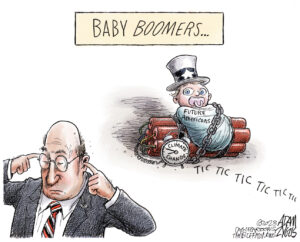

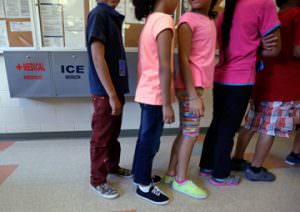
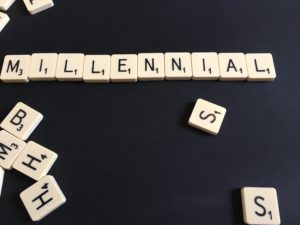
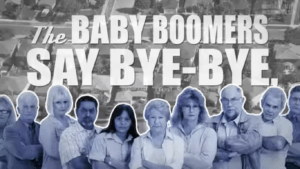
You need to be a supporter to comment.
There are currently no responses to this article.
Be the first to respond.